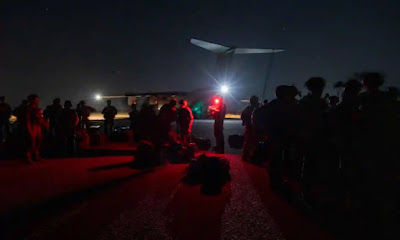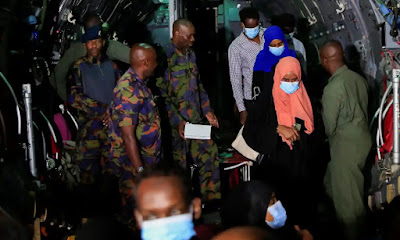NOTE from Sudan Watch Ed: In this report Cameron Hudson, an expert in US-Africa policy, puts the Sudan fight in a nutshell by saying (and I couldn't agree more) “There is no chance of putting a lid on this now, none whatsoever”. I say, Burhan and Hemeti will only stop if arrested or dead.
Report from The Guardian
By Jason Burke , Zeinab Mohammed Salih in Khartoum and Kaamil Ahmed
Monday 24 April 2023 18.49 BST UK
Last modified on Mon 24 Apr 2023 20.39 BST
Sudan: thousands flee Khartoum as civilian casualties escalate
Lack of supplies and rising prices add to perilous journey by road to Egyptian border and Port Sudan
Thousands more residents of Khartoum fled the Sudanese capital on Monday, risking long, dangerous journeys to escape continued street battles and murderous airstrikes that continue to cause significant civilian casualties.
Some headed north by road to the Egyptian border in packed buses, many with towering piles of luggage strapped to them. Others drove north-east to Port Sudan. Both journeys involved up to 24 hours of driving, with increasing reports of robbery of vehicles.
Many in Khartoum fear that rival factions fighting for control of the city will intensify their power struggle when the evacuations of foreign citizens have finished. The latest ceasefire, which brought almost no reduction in fighting, was due to run out Monday evening.
IMAGE MAP: Overland routes to flee the fighting in Sudan
1. Egypt
Witnesses say buses carrying hundreds of people have been lining up at the remote Arqin border crossing
2. Port Sudan
There have been long convoys on the road from Khartoum to Port Sudan on the Red Sea coast, from where people have left Sudan by air and sea
3. Ethiopia
Hundreds of people have arrived in the Ethiopian
town of Metema Yohannes near the Sudan border, the local mayor said on Monday
4. South Sudan
Officials in Renk County said on Monday they had received about 10,000 people since the crisis started
5. Chad
The UN says 10,000-20,000 people have fled fighting in Darfur region to seek refuge in neighbouring Chad in recent weeks
Guardian graphic
The UN secretary general, António Guterres, warned a session of the security council in New York that the violence “risks a catastrophic conflagration … that could engulf the whole region and beyond”. He urged the 15 council members to work to end the violence.
“We must all do everything within our power to pull Sudan back from the edge of the abyss … We stand with them at this terrible time,” he said, adding he had authorised the temporary relocation of some UN personnel and families.
Throughout the day, convoys of foreign diplomats, as well as teachers, students, workers and families from dozens of countries wound past combatants at tense frontlines in Khartoum to reach extraction points. A stream of European, Middle Eastern, African and Asian military aircraft flew in all day Sunday and Monday to ferry some of them out.
The violence in Sudan has pitted army units loyal to its military ruler, Gen Abdel Fattah al-Burhan, against the Rapid Support Forces, led by Mohamed Hamdan Dagalo, known as Hemedti. Few now believe that it is possible to bring the combatants to the negotiating table.
“There is no chance of putting a lid on this now, none whatsoever,” said Cameron Hudson, an expert in US-Africa policy at the Center for Strategic and International Studies in Washington.
Many in Khartoum have now been trapped in their homes for nine days. The prices of increasingly rare food and fuel are soaring, electricity is patchy and internet rarely working. In many neighbourhoods, armed fighters are looting shops and homes.
Residents of Khartoum on Monday reported sporadic explosions, gunfire and airstrikes, including one in the neighbouring city of Omdurman that killed a reported five people and injured about 50.
Shelling of Khartoum’s Kalakla district continued for an hour until the area was “razed to the ground”, said Attiya Abdulla Atiya, secretary of the Sudan Doctors Syndicate. The bombardment sent dozens of wounded to the Turkish hospital, one of the few medical facilities still functioning in the city, he said.
Abou-Obaida Abashar, a 33-year-old banker, fled his family house in the al-Fetihab neighbourhood after an airstrike hit his house and that of his neighbours.
“A plane was trying to hit 15 to 16 RSF vehicles in the area, but I am not sure if they meant to hit the houses or that came by accident, but it terrified everybody and it made us all run, some with only the clothes that they were wearing, they even didn’t take anything with them. The area has been emptied now,” Abashar said.
Those without the funds to pay for transport to Egypt or Port Sudan headed out of the city to relatively calmer provinces along the Nile north and south of Khartoum. Many more were trapped, with limited cash and transport costs spiralling.
“Travelling out of Khartoum has become a luxury,” said Shahin al-Sherif, a 27-year-old high school teacher hoping to arrange transport out of Khartoum for himself, his younger sister, mother, aunt and grandmother. The family had been trapped for days in their home in Khartoum’s Amarat neighbourhood while fighting raged outside before managing to move to a safer district farther out.
But al-Sherif expects things to get worse and is worried his sister, aunt and grandmother, all diabetic, will not be able to get the supplies they need. Bus ticket prices have more than quadrupled so renting a bus for 50 people to get to the Egyptian border costs about $14,000, he said.
Some Sudanese people have expressed anger that western countries have seemingly prioritised evacuating their people over trying to stop the fighting.
With a series of ceasefires failing to hold, the confirmed death toll in Sudan has now passed 420, including 264 civilians, and more than 3,700 people have been wounded, according to local and international NGOs. However, most analysts believe the true total of fatalities and injuries in more than nine days of fighting is much higher.
The US has warned of shortages of vital medicines, food and water in Sudan and deployed disaster response experts to the region.
Samantha Power, the head of the US Agency for International Development (USAID), painted a grim picture of the reality on the ground.
“Fighting … has claimed hundreds of lives, injured thousands, and yet again dashed the democratic aspirations of Sudanese people. Civilians trapped in their homes cannot access desperately needed medicines, and face the prospect of protracted power, water and food shortages,” Power said.
“All of this suffering compounds an already dire situation: one-third of Sudan’s population, nearly 16 million people, already needed humanitarian assistance to meet basic human needs before this outbreak of violence.”
The World Health Organization has verified 11 attacks on healthcare facilities since the start of the conflict, with the remaining sites in Khartoum and the south-western Darfur states facing an acute lack of supplies amid increasing needs. Emergency medical supplies that had been pre positioned are now running out, the WHO said.
Internet and phone services appeared to have collapsed across much of country. Medicine, fuel and food were scarce in much of Khartoum, while a combination of fighting and looting made leaving home to search for essential provisions dangerous.
The communications blackout has starved those still in the conflict areas of up-to-date information on the fighting and left their families abroad uncertain about their safety, with international calls also failing to connect. The few in Sudan with internet access have offered on social media to make local phone calls on behalf of those abroad.
Maryam, a Sudanese student in the United Arab Emirates who did not want to use her real name for her family’s safety, said she lost contact with her family on Sunday as they were on a bus heading from Khartoum to the Egyptian border.
When she managed to finally get through on Monday afternoon, her family were waiting to cross over to Egypt. Their bus had broken down several times on the journey, during which the driver decided to raise the price and threatened to offload anyone who could not pay.
“The last we’d heard from them they’d been about an hour from the border headed towards the Aswan border. Most of my family – including my sister, her kids and husband, some aunts, uncles and cousins – were on the bus together,” Maryam said.
The Sudanese army has blamed the outages on the RSF damaging infrastructure.
VIDEO: Sudan: evacuees brave 'risky' travel as fighting intensifies – video report
View original: https://www.theguardian.com/world/2023/apr/24/sudan-thousands-flee-khartoum-as-civilian-casualties-escalate
[Ends]





